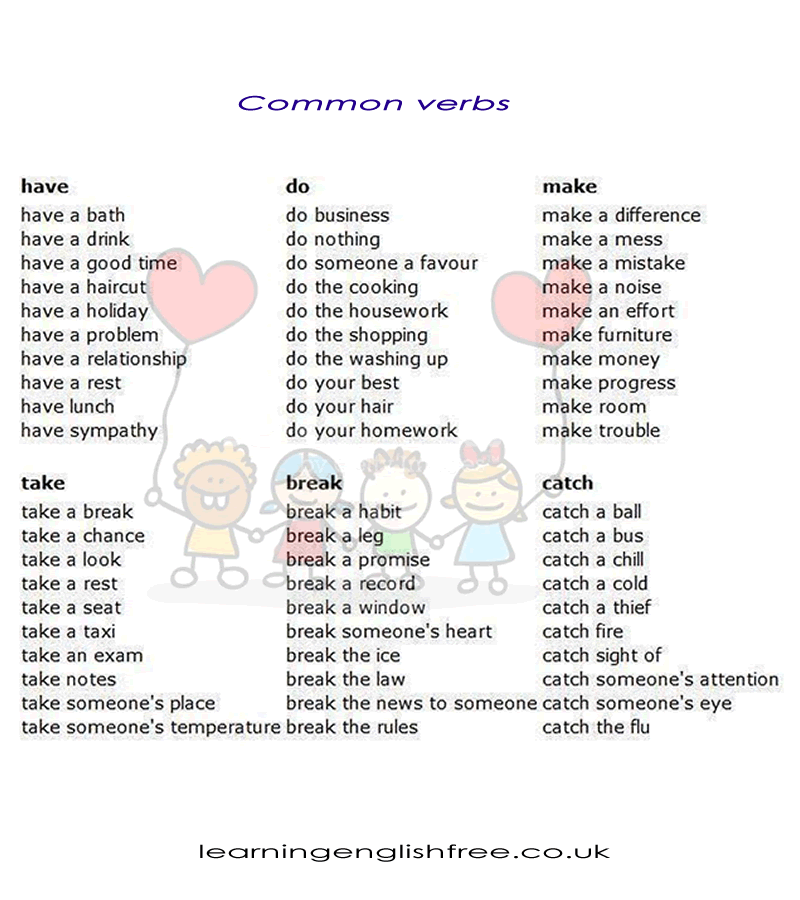
Common verbs examples
Have
- Have a relationship: "They have a relationship that's lasted for years."
- Have a rest: "You should have a rest after such hard work."
- Have lunch: "We usually have lunch around noon."
- Have sympathy: "I have sympathy for their situation."
- Have a bath: "She likes to have a bath before bed."
- Have a drink: "Let's have a drink after work."
- Have a good time: "I hope you have a good time at the party."
- Have a haircut: "He needs to have a haircut soon."
- Have a holiday: "They're planning to have a holiday in Spain."
- Have a problem: "We have a problem with the internet connection."
Do
- Do your hair: "She takes time to do her hair every morning."
- Do business: "Our company does business with clients worldwide."
- Do nothing: "Sometimes I like to do nothing and relax."
- Do someone a favour: "Could you do me a favour and pass the salt?"
- Do the cooking: "I usually do the cooking on weekends."
- Do the housework: "He does the housework on Saturdays."
- Do the shopping: "I need to do the shopping for groceries."
- Do the washing up: "After dinner, I do the washing up."
- Do your homework: "Children, remember to do your homework!"
- Do your best: "Always do your best in every task."
Take
- Take a break: "Let's take a break for ten minutes."
- Take a chance: "Sometimes, you have to take a chance and try new things."
- Take a look: "Could you take a look at this report?"
- Take a rest: "You should take a rest if you're feeling tired."
- Take a seat: "Please take a seat, the show is about to start."
- Take a taxi: "We'll need to take a taxi to get there on time."
- Take an exam: "Students will take an exam at the end of the semester."
- Take notes: "It's important to take notes during the lecture."
- Take someone's place: "I had to take his place in the meeting."
- Take someone's temperature: "The nurse will take your temperature."
Make
- Make a difference: "Volunteering can really make a difference in the community."
- Make a mess: "The kids made a mess in the living room."
- Make a mistake: "Everyone makes mistakes sometimes."
- Make a noise: "Please don't make a noise while the baby is sleeping."
- Make an effort: "He made an effort to arrive on time."
- Make furniture: "My grandfather used to make furniture by hand."
- Make money: "They make money by selling handmade crafts."
- Make progress: "She's making progress in her piano lessons."
- Make room: "Can you make room for one more person in the car?"
- Make trouble: "He's always making trouble at school."
Catch
- Catch a ball: "The player managed to catch the ball."
- Catch a bus: "We need to catch the bus at 8 am."
- Catch a chill: "Be careful not to catch a chill in the cold weather."
- Catch a cold: "I think I caught a cold from the rain."
- Catch a thief: "The security cameras helped to catch the thief."
- Catch the flu: "Many people catch the flu during winter."
- Catch fire: "The dry grass easily caught fire."
- Catch sight of: "She caught sight of a deer in the woods."
- Catch someone's attention: "The loud noise caught everyone's attention."
- Catch someone's eye: "The beautiful painting caught her eye."
Break
- Break the law: "You break the law when you drive over the speed limit."
- Break a record: "The athlete aimed to break a record at the event."
- Break a window: "The ball accidentally broke a window."
- Break the ice: "Telling a joke can help to break the ice in a tense room."
- Break the news to someone: "He had to break the news to her gently."
- Break the rules: "If you break the rules, there are consequences."
- Break someone's heart: "It's sad when a relationship ends and someone's heart gets broken."
- Break a habit: "Quitting smoking is like trying to break a habit."
- Break a leg: "Good luck on your performance – break a leg!"
- Break a promise: "It's important not to break a promise to a friend."
Each sentence showcases how these collocations are used in everyday English to describe various actions and situations.
